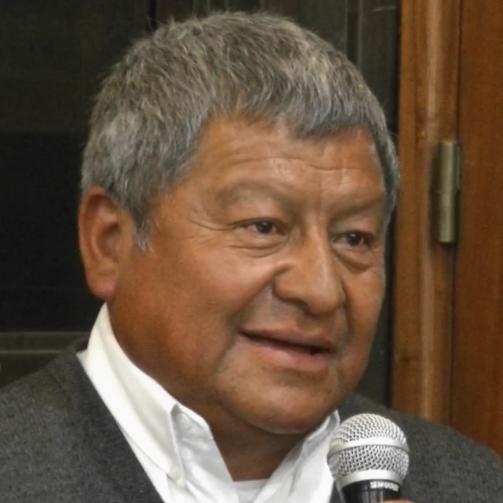Entrevista con Asunción Ontiveros Yulquila, Simposio de 2015 / Asunción Ontiveros Yulquila Interview, 2015 Symposium
Entrevista con Asunción Ontiveros Yulquila, Simposio de 2015 / Asunción Ontiveros Yulquila Interview, 2015 Symposium
Esta entrevista fue transcrita y subtitulada en su idioma original. Con este fin, tienen que hacer clic en el botón 'CC' que se encuentra en la parte de abajo, derecha del video. También pueden activar los subtítulos en otro idioma, y tienen que hacer clic en las opciones del video, después seleccionar la parte de los subtítulos, más adelante escoger la opción de 'traducir automáticamente' y finalmente elegir el idioma de su elección.
Asunción Ontiveros Yulquila empieza explicando que, en los años 70, en Argentina, se manifestaba la segregación racial en el ámbito laboral y se estratificaba a la gente, lo que tenía un impacto en el nivel de calidad de vida. Además, afirma que la Constitución argentina vigente veía a los indios como un obstáculo para el desarrollo del país. Si embargo, hubo cambios a partir del conflicto por la posesión de las islas Malvinas entre Gran Bretaña y Argentina, que culminó en una crisis existencial en Argentina. Un debate tuvo lugar en la Asamblea Permanente de los Derechos Humanos de Argentina sobre cómo recuperar la cultura nacional y en ese contexto apareció el Centro Kolla de Buenos Aires.
Asunción Ontiveros Yulquila cuenta que el Centro Kolla les permitió crecer día a día y participar de manera muy activa en esa época: dirigieron el Consejo Indio de Sud América (CISA) donde él mismo fue nominado Coordinador General, tuvieron representantes en las Naciones Unidas, fueron parte del Consejo Mundial de Pueblos Indígenas (CMPI), participaron en negociaciones por la paz y también realizaron eventos internacionales. Todo eso contribuyó a que, en 1985, el Congreso de la Nación Argentina aprobara una ley sobre política indígena y apoyo a las comunidades aborígenes.
Entonces su mensaje a los jóvenes es que se impliquen y se sientan parte de su comunidad de tal manera que podrán formar parte del desarrollo de las políticas de los Estados y reivindicar derechos. Afirma que hoy en día hay muchos instrumentos y universidades, incluso una legislación internacional de las Naciones Unidas, para guiar a los jóvenes y ayudarlos a «abordar el pasado, apropiarse el presente, para proyectar un futuro mejor».
//
This interview has been transcribed and subtitled in its original language. To that end, you have to click on the 'CC' button at the bottom, right hand side of the video. You can also activate subtitles in another language, by going into the settings of the video, then clicking on the subtitles section, then choosing the option 'auto-translate' and finally the language of your choice.
Asunción Ontiveros Yulquila begins by explaining that in the 1970s, in Argentina, there was racial segregation in the workplace and people were stratified. Such a situation had an impact on the quality of life. He also states that the Argentine Constitution in force at that time situated the Native Indians as obstacles to the development of the country. However, things changed after the Falklands War — a conflict between Great Britain and Argentina over control of the Falkland Islands (Islas Malvinas) — which led Argentina to experience an existential crisis. A debate took place in the Argentine Permanent Assembly for Human Rights on how to revive national culture. It was in that context that the Kolla Center (Centro Kolla) was created in Buenos Aires.
Asunción Ontiveros Yulquila says that the Kolla Center helped them grow day after day and to become very actively involved at that time: they were at the head of the Indian Council of South America (CISA) where he was appointed General Coordinator, they had representatives at the United Nations, they were part of the World Council of Indigenous Peoples (WCIP), they participated in peace negotiations and also held international events. All of that contributed to the National Congress of Argentina passing a law on Indigenous Policy and Aboriginal Community Support in 1985.
His message to the youth is therefore to get involved and feel part of their community so that they can participate in the development of state policies and claim rights. He says that today there are many instruments and universities, including United Nations’ international legislation, to guide young people and help them “confront the past, seize the present, in order to project a better future”.
United Nations, Geneva, Switzerand / Naciones-Unidas, Ginebra, Suiza


